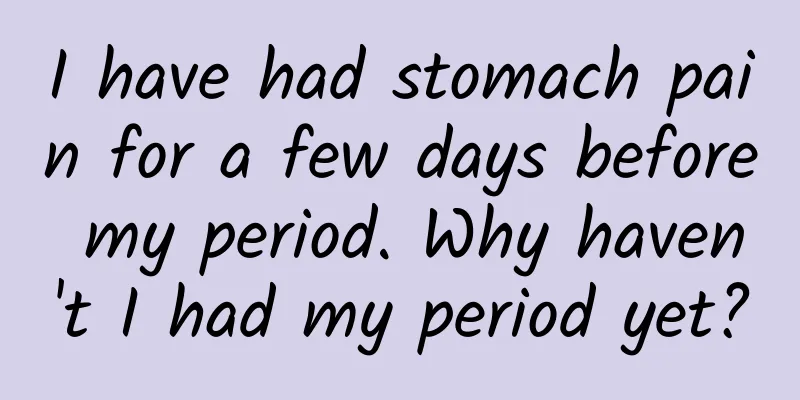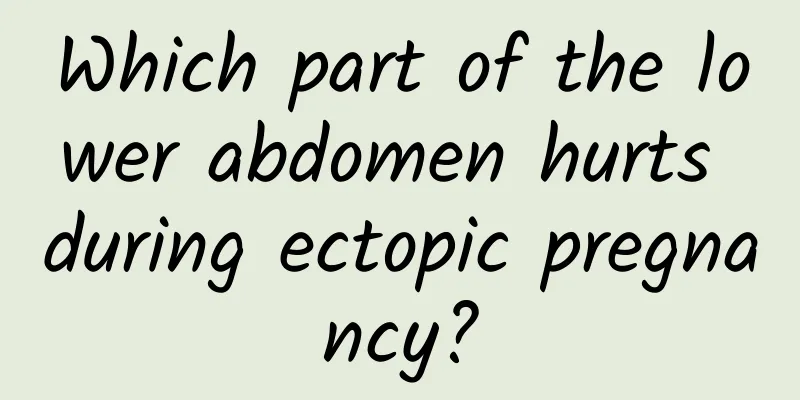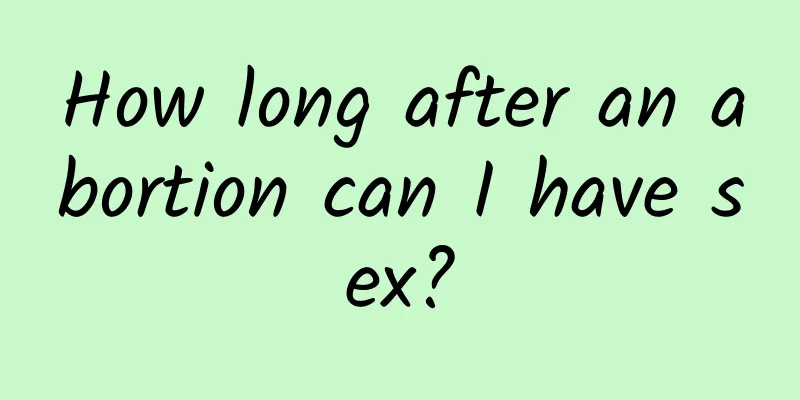I have had stomach pain for a few days before my period. Why haven't I had my period yet?

|
It can be confusing to have abdominal pain for a few days before your period but your period has not come. This condition can be caused by a variety of reasons and requires careful observation and timely medical attention. 1. Possibility of pregnancy If you have abdominal pain before your period but your period is late, pregnancy may be a reason. This is especially true if you have had unprotected sex. You can use pregnancy test strips or sticks to self-test 7 to 10 days after your period stops. These tools can be used conveniently at home, but in order to get more accurate results, it is recommended to go to the hospital for further examinations, such as urine pregnancy test, blood HCG, blood progesterone test or pelvic color Doppler examination. These tests can help determine whether you are pregnant. 2. Impact of pelvic inflammatory disease Pelvic inflammatory disease is another possible cause. This is a disease caused by infection with pathogens such as bacteria and mycoplasma, which may cause congestion, edema and exudation in the pelvic tissue, causing abdominal pain. If you suspect that you have pelvic inflammatory disease, it is very important to see a doctor in time. The doctor may confirm the diagnosis through pelvic examination, ultrasound examination, etc., and give treatment such as antibiotics depending on the specific situation. 3. Interference from ovarian cysts Ovarian cysts are also a common cause of abdominal pain before menstruation. If the cyst is large, it may cause pressure on the surrounding tissues, causing abdominal pain and delayed menstruation. Generally, ovarian cysts may disappear on their own, but if the symptoms are severe or the cyst is large, surgery may be required. Regular gynecological examinations can help detect and treat ovarian cysts early. 4. The impact of stress and emotions Sometimes, mental stress and mood swings can also affect your menstrual cycle. Stress, anxiety, and major life changes can cause your period to be late or irregular. Trying to reduce stress through relaxing activities, exercise, meditation, etc. may help restore a normal menstrual cycle. 5. Adjustment of living habits A healthy lifestyle can also help regular menstrual cycles. Maintaining a balanced diet, exercising moderately, and getting enough sleep can all contribute to overall health. If you find that your menstrual cycle is irregular, reflecting on your lifestyle habits and making appropriate adjustments may help. When you experience abdominal pain before your period and your period is late, you don't need to panic, but you can't take it lightly. Observing your body changes, seeking medical attention when necessary, and following your doctor's advice can help you better understand and manage your health. Maintaining good living habits and a positive attitude are also important factors in maintaining health. |
<<: What if my period is delayed after taking contraceptive measures?
>>: What is the reason for not having menstruation?
Recommend
What are the chances of curing bacterial vaginosis?
The four major issues in the treatment of bacteri...
Analyze the factors of irregular menstruation for you
Among the gynecological diseases of women, irregu...
Can Bartholinitis be cured?
The main cause of Bartholinitis comes from sexual...
Analysis of common examination and diagnosis methods for pelvic inflammatory disease
It is very important for female patients with pel...
What causes bleeding from multiple uterine fibroids? What to do if bleeding from multiple uterine fibroids occurs?
What causes bleeding from multiple uterine fibroi...
What is the impact of threatened miscarriage on people?
It has become an indisputable fact that environme...
What are the symptoms of uterine fibroids? Common hazards of uterine fibroids
Nowadays, due to the attention paid by female fri...
Get rid of belly fat~ Homemade "Chinese herbal oil-cut green tea" helps reduce fat
Eating and drinking a lot at the year-end party m...
A must-see for noodle lovers! How to eat noodles to lose weight? When is the best time to eat noodles?
A must-see for noodle lovers! Many women are afra...
How to stay away from uterine fibroids?
How to prevent uterine fibroids? Many female frie...
Can focused ultrasound treat cervical erosion?
Can focused ultrasound treat cervical erosion? 1....
What tests should be done for miscarriage
Pregnant women who do not want to have children o...
Experts explain the signs of ovarian cysts before onset
For female friends, if the signs of ovarian cysts...
Abnormal vaginal discharge and foul-smelling urine
Abnormal vaginal discharge and odorous urine may ...
Does exercising on an empty stomach help burn fat? Don’t make the mistake of following these 4 sports myths!
You finally started exercising, but are restraine...









